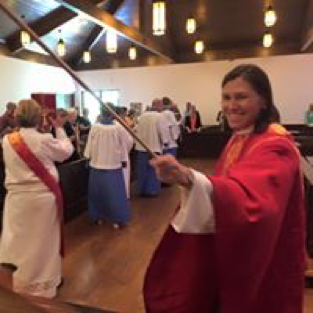Proper 13A: Jesus’ Grief
By: The Rev. Ann Dieterle
How many times does the lectionary pick up a gospel reading with some form of the phrase that begins the selection for this proper: “after he heard this…?”
Especially in instances where the lectionary does not treat the text sequentially, as is the case here, it’s important to explore exactly what it was that Jesus heard. In this instance, he heard about the death of John the Baptist in a gruesome affair involving his head being delivered to Herod’s wife, Herodias, on a silver platter. It seems that John had gotten on Herodias’ bad side. Beware the thin skin of politicians. This had to have been on Jesus’ mind as he withdrew. To a deserted place. By himself. In case you missed any of the clues that Jesus went to be alone, Matthew drives the point home in a redundant manner.
The place that I connect with Jesus in this text is not in the Eucharistic metaphor but in his grief. One imagines that he is mourning the death of his cousin and forerunner. My father died rather unexpectedly about 2 months ago at the point that I am writing this entry, and so it is inevitably the lens with which I view Scripture right now. We don’t know how long Jesus stays in the deserted place by himself but it reads as a brief interlude. He doesn’t get a lot of time and space because the crowd follows him on foot along the shore.
You know, with 2000 years of Christian history and living in a Judeo-Christian society, we might take these stories and the divinity of Jesus for granted, forgetting that he was also human. He must have felt the emotional, spiritual, and physical fatigue of his grief- compounded by the fact that this foreshadowed his own execution. Yet in the midst of it all he sees the crowd and has compassion for them. And he resumes his work of curing the sick.
I had to do a funeral very shortly after I returned from burying my dad, and on the 2-month anniversary of his death I was in the cardiovascular ICU with someone who was in critical condition—this was the same kind of unit in which my dad spent the last 24 hours of his life. It takes extra emotional energy now to be present and the recovery time for me after these moments is significant. And so I wonder what was the cost to Jesus to do this? To show up in this moment and be present to the crowd and to his disciples? Have you had an experience like this? And more to the point—what members of your congregation have had experiences like this? “The show must go on,” right? Do we ever afford ourselves the quiet and the space to do life’s essential work? Whether that’s grief? Joy? Or something else? I did withdraw to a deserted place by myself and that is following Jesus’ example as much as anything else in the Gospels.
Maybe when the disciples asked Jesus to send the crowd away into the villages, they’re not dismissing them so much as trying to build in some space and rest for Jesus. We don’t know of course, but surely they are surprised at Jesus’ response: “You give them something to eat.” Can you just see the expression on their faces change from concern to shock? And then maybe the shock turns into incredulity. The translation from Greek to English ‘we have five loaves and two fish’ is pretty straightforward but I think the translation from thought to words was something more like “are you freaking kidding me?”
One of the challenges of preaching on this proper is that this is such a familiar story. In an entry in the periodical Christian Century, Lauren Winner recommends reading Scripture in a location different from what you’re used to. I did this and I found myself wondering—were there really 5000 men plus the women and children? Or did the disciples overestimate the size of the crowd because they underestimated their ability?
And what about that crowd? What did it feel like to be fed from this abundance? Were they even in on the miracle or was that simply between the disciples and Jesus?
One other aspect of the text that we miss if we go by the lectionary rather than read the Gospel all at once is that an almost identical situation comes up shortly after this takes place.
Fast-forward to a few paragraphs later in Matthew’s gospel. It’s hard to tell how much time has passed though Jesus has been in several other towns before finding himself back along the Sea of Galilee, and this is what happens:
“He went up the mountain, where he sat down. Great crowds came to him, bringing with them the lame, the maimed, the blind, the mute, and many others. They put them at his feet, and he cured them, Then Jesus called his disciples to him and said, ‘I have compassion for the crowd, because they have been with me now for three days and have nothing to eat; and I do not want to send them away hungry, for they might faint on the way.’ (Matthew 15:32-39)
And the disciples just did this a few paragraphs back, so naturally their response is:
“We’re on it, Lord! We’ll see how many loaves of bread that we can find and maybe someone has a few fish that they’ll share. We’ll bring that to you so you can bless it and we know we’ll end up with a feast and plenty of leftovers…”
Yeah right. You’ve done the reading so you know that’s not what happened at all. Instead, the disciples said:
“But Jesus, Panera is closed now and the grocery store’s too far and you know the restaurants won’t do separate checks…”
Or something like that. I’m paraphrasing.
Jesus must have a bottomless well of patience, because goodness knows the disciples. Just. Don’t. Get it.
But there is good news in that for us. No matter how many times we have to relearn the same lesson. No matter how many times we make the same mistake. No matter how many times we miss an opportunity.
Jesus has patience with us—and we always get another chance to gather the loaves and fishes, and to share in the feast.
 The Rev. Ann Dieterle is the Rector of St. Paul’s Episcopal Church in Wilkesboro, North Carolina. She enjoys walking with her goldendoodle, Gordon, throwing culinary theme parties for her friends, and is a proud Star Wars nerd. Ann graduated from Sewanee and Florida State University, and hopes to add Australia to the list of continents she’s visited before 2020.
The Rev. Ann Dieterle is the Rector of St. Paul’s Episcopal Church in Wilkesboro, North Carolina. She enjoys walking with her goldendoodle, Gordon, throwing culinary theme parties for her friends, and is a proud Star Wars nerd. Ann graduated from Sewanee and Florida State University, and hopes to add Australia to the list of continents she’s visited before 2020.
